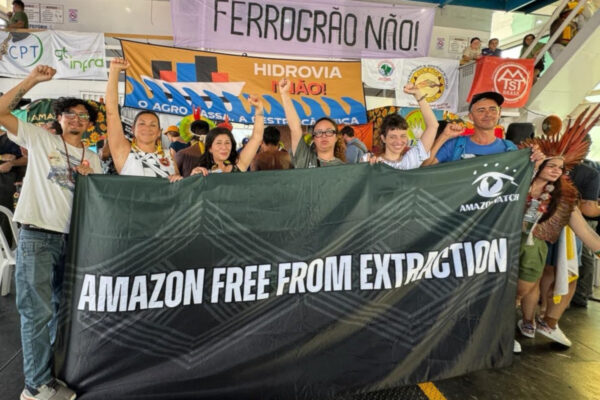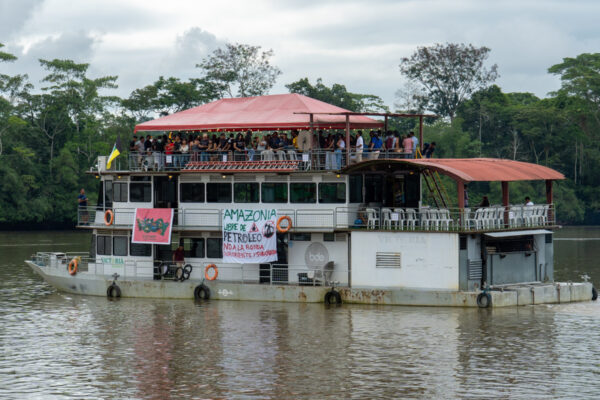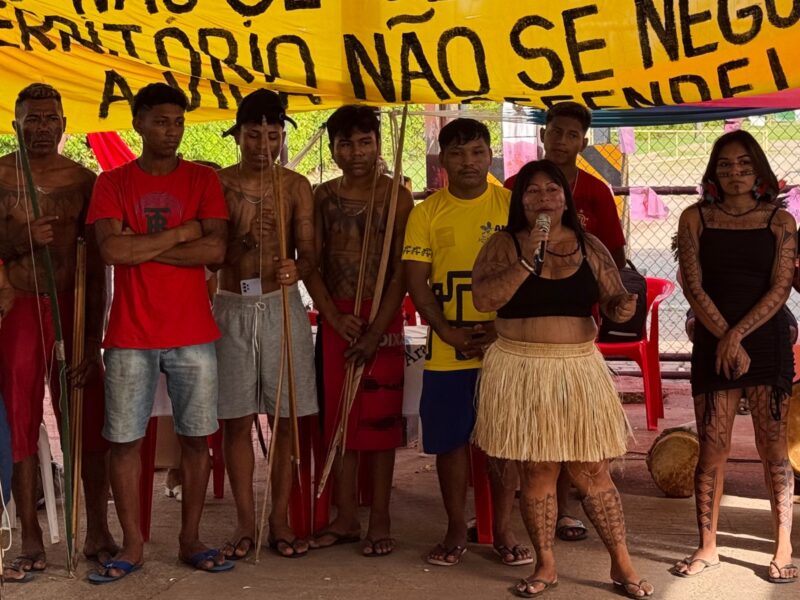On April 15, representatives of the Munduruku resistance movement met with Supreme Court Justice Gilmar Mendes to demand the annulment of Federal Law 14.701/23 and the cessation of the Brazilian Supreme Court’s (STF) attempts to slash Indigenous constitutional rights.
The audience with Justice Mendes was the result of unwavering struggle. For two weeks, a contingent of around 150 Munduruku representatives blockaded Brazil’s Trans-Amazonian highway demanding that their voices be heard by the STF. The mobilization also called attention to the worsening attacks on forests and forest peoples in Pará state, hosts to this year’s COP30 climate summit.
During the occupation of the Trans-Amazonian highway, the Munduruku engaged in peaceful protest and complied with court orders to clear the road at certain periods of the day. The protest took place on a strategic stretch for grain shipping between Mato Grosso state and river ports in Pará, located in the city of Itaituba in the middle Tapajós River basin. The region is threatened by illegal gold mining, soybean expansion, and infrastructure projects that violate Indigenous rights, such as Ferrogrão – a railway designed to boost soybean exports via the Tapajós, one of the most important tributaries in the Amazon.
During the blockade, Munduruku protestors were subjected to racism, verbal abuse, threats, and physical violence from truck drivers transporting agricultural commodities. Undeterred, Munduruku banners and statements decried the STF’s moves to silence their voices and severely restrict Indigenous land rights. They demanded to be heard directly by the STF in all matters that affect them, and especially within the “Special Commission” instituted by Justice Mendes to regulate – and undermine – Indigenous constitutional rights.
The Commission, also referred to as a “Negotiation Arena,” is an ad hoc working group instituted by Justice Mendes to discuss changes to the regulation of Indigenous land rights. It was created after Congress passed Federal Law 14.701/23, overruling vetoes by President Lula, establishing a set of unconstitutional barriers to the Indigenous right to their ancestral territories. Instead of carrying out a judicial review of the legislation, Justice Mendes formed the commission to establish a “consensual solution” to the “problem” of Indigenous land rights. However, its proposed “solutions” aim to suppress Indigenous perspectives and bar their rightful demands to land.
The Commission is composed of representatives from anti-Indigenous political and economic sectors. The voices of agribusiness and the extractive industry dominate proposals being discussed: the opening up of Indigenous lands to large-scale extractivism, including industrial mining; the restriction of the right to Free, Prior and Informed Consultation; creating barriers to Indigenous land demarcation; and the development of infrastructure and military projects within native lands without community consent. Meanwhile, Indigenous grassroots associations and movements have been excluded from discussions that imperil their rights and their existence.
On April 8, after two weeks of protest on the Trans-Amazonian highway, the Munduruku received a message from Justice Mendes: he would receive their representatives on April 15. The movement immediately made its way to Brasília, where it held meetings with the National Foundation of Indigenous Peoples (FUNAI), the Justice Ministry, and the Health Ministry before meeting with Justice Mendes.
During the meeting, the Munduruku criticized the STF for negotiating with agribusiness and mining representatives without including all Indigenous peoples directly affected. The delegation delivered a letter signed by six Munduruku organizations, denouncing that the court has been conducting “closed-door meetings, without free, prior and informed consultation, while land demarcation processes remain threatened or stalled.”
The Munduruku also opposed Gilmar Mendes’ proposal, considered illegitimate by Brazil’s Indigenous movement, which aims to replace Law 14.701/23. In exchange for formally dropping the Marco Temporal thesis, the proposal imposes new barriers to land demarcation, provides financial compensation to non-Indigenous occupants who are removed from Indigenous lands in demarcation processes, and allows projects deemed of “relevant public interest of the Union” to be implemented in Indigenous territories while denying affected communities the right of consent.
In the letter delivered to the minister, the Munduruku insisted that all decisions regarding their territories must respect the Constitution and the right to consultation guaranteed by International Labor Organization Convention 169. “We do not recognize this negotiation without our presence or consent!” the letter asserts.
Although Justice Mendes only agreed to receive the Indigenous delegation after an arduous and dangerous two-week blockade of the Trans-Amazonian highway, he said that the doors of the Supreme Court and of his office remain open to dialogue with Indigenous peoples. He did not commit to any of the demands presented but stated that he would take the Munduruku’s arguments into consideration in the next phases of the conciliation process.

“It was a struggle to get to this meeting. We spent days and nights under the sun and rain, blocking cargo transport on the highway. We had to hit agribusiness in the pocket to be heard by the Supreme Court,” said Alessandra Korap, a Munduruku leader.
As longtime partners with the Munduruku, Amazon Watch supported their recent mobilizations as well as their audience at the Supreme Court. At this critical moment for upholding human rights and environmental protection in Brazil, the international community’s support and vigilance are vital in guaranteeing the defense of Indigenous rights and the conservation of the Amazon rainforest for generations to come.













